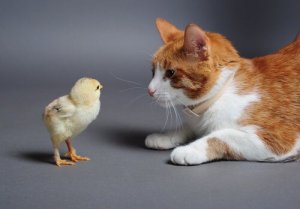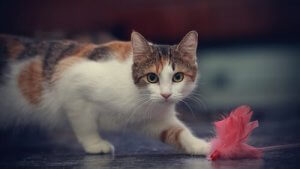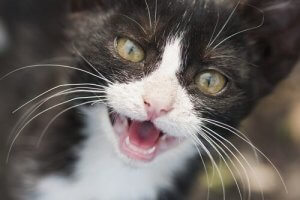Why Do Cats Make a Noise When They See a Bird?

It’s true that animals share many similarities with humans. However, it’s also true that they have a lot of behavior patterns that are nothing like our own. As a result, this makes it difficult for us to understand other species. If you’ve ever asked yourself why cats make a noise with their teeth when they see a bird, then here’s the answer.
Scientists have seen a lot of opportunity for research in this area. This article will take a look at their conclusions. Why do cats make a noise with their teeth when they see a bird?
The reasons why cats make a noise with their teeth when they see a bird

When they see prey
When a cat sees possible prey, its teeth start to chatter. This happens regardless of whether the prey is a bird, a mouse, or an insect. It could be any small animal that attracts the cat’s attention and that they want to eat.
One way of knowing if the sound is linked to the cat seeing prey is to watch their body language. When a cat sees something they like, they’ll move their tail from side to side and they’ll fix their gaze on their next prey.
Keep an eye on your cat because, if you keep a bird as a pet in your home too, then this might be a problem.
When they hunt
Cats also make this sound when they’re getting ready to hunt. According to scientists, cats make this sound out of frustration when they can’t reach the prey they see in front of them.
Sometimes cats are so excited by having discovered new prey that their own excitement prevents them from moving towards and chasing it. This sound, therefore, allows them to release their frustration at themselves and let off steam.
Are they training to hunt?
There are different theories on this topic. One suggests that this is an instinctive sound that cats make as if they’re biting into the neck of their prey. This is a technique they usually use when hunting. It’s almost as if they’re warming up their jaw and preparing their teeth for the attack.
It’s very important for a cat to kill its prey as soon as it gets hold of it. Repeating this behavior could be a way of training themselves to ensure their hunts are successful, given that live prey could try to escape and hurt the cat.
In addition to a way of training, this sound could therefore also be a way of guaranteeing a successful hunt. It could be a way of defending themselves if they catch anything.
Imitation

A new theory about this sound is that cats try to imitate the sound of their prey to attract them more easily.
A team of researchers came to this conclusion after observing Amazonian monkeys and wild cats.
The monkeys made a very peculiar sound, which was a strange form of communication they used among themselves. When the cats saw them approach, they made a sound with their teeth that was almost identical to the sound of the monkeys.
These scientists concluded that “Cats are known for their physical agility, but this vocal manipulation of prey species indicates a psychological cunning which merits further study.”
There’s no doubt that cats continue to surprise us. Although they are mysterious creatures, we’re steadily developing our understanding of them.
Understanding your cat’s behavior and its body language will help you get to know it better. It will also help you strengthen your relationship. Remember that all the effort you put into reading about, studying, and observing your cat will reap rewards.
Cats are mysterious animals and perhaps difficult to live with. However, there’s no doubt that your efforts to deepen your understanding of your cat will make things much easier. Don’t underestimate how observing and reading about your cat can help you meet its needs, understand it better and live together in perfect harmony.
It’s true that animals share many similarities with humans. However, it’s also true that they have a lot of behavior patterns that are nothing like our own. As a result, this makes it difficult for us to understand other species. If you’ve ever asked yourself why cats make a noise with their teeth when they see a bird, then here’s the answer.
Scientists have seen a lot of opportunity for research in this area. This article will take a look at their conclusions. Why do cats make a noise with their teeth when they see a bird?
The reasons why cats make a noise with their teeth when they see a bird

When they see prey
When a cat sees possible prey, its teeth start to chatter. This happens regardless of whether the prey is a bird, a mouse, or an insect. It could be any small animal that attracts the cat’s attention and that they want to eat.
One way of knowing if the sound is linked to the cat seeing prey is to watch their body language. When a cat sees something they like, they’ll move their tail from side to side and they’ll fix their gaze on their next prey.
Keep an eye on your cat because, if you keep a bird as a pet in your home too, then this might be a problem.
When they hunt
Cats also make this sound when they’re getting ready to hunt. According to scientists, cats make this sound out of frustration when they can’t reach the prey they see in front of them.
Sometimes cats are so excited by having discovered new prey that their own excitement prevents them from moving towards and chasing it. This sound, therefore, allows them to release their frustration at themselves and let off steam.
Are they training to hunt?
There are different theories on this topic. One suggests that this is an instinctive sound that cats make as if they’re biting into the neck of their prey. This is a technique they usually use when hunting. It’s almost as if they’re warming up their jaw and preparing their teeth for the attack.
It’s very important for a cat to kill its prey as soon as it gets hold of it. Repeating this behavior could be a way of training themselves to ensure their hunts are successful, given that live prey could try to escape and hurt the cat.
In addition to a way of training, this sound could therefore also be a way of guaranteeing a successful hunt. It could be a way of defending themselves if they catch anything.
Imitation

A new theory about this sound is that cats try to imitate the sound of their prey to attract them more easily.
A team of researchers came to this conclusion after observing Amazonian monkeys and wild cats.
The monkeys made a very peculiar sound, which was a strange form of communication they used among themselves. When the cats saw them approach, they made a sound with their teeth that was almost identical to the sound of the monkeys.
These scientists concluded that “Cats are known for their physical agility, but this vocal manipulation of prey species indicates a psychological cunning which merits further study.”
There’s no doubt that cats continue to surprise us. Although they are mysterious creatures, we’re steadily developing our understanding of them.
Understanding your cat’s behavior and its body language will help you get to know it better. It will also help you strengthen your relationship. Remember that all the effort you put into reading about, studying, and observing your cat will reap rewards.
Cats are mysterious animals and perhaps difficult to live with. However, there’s no doubt that your efforts to deepen your understanding of your cat will make things much easier. Don’t underestimate how observing and reading about your cat can help you meet its needs, understand it better and live together in perfect harmony.
This text is provided for informational purposes only and does not replace consultation with a professional. If in doubt, consult your specialist.








